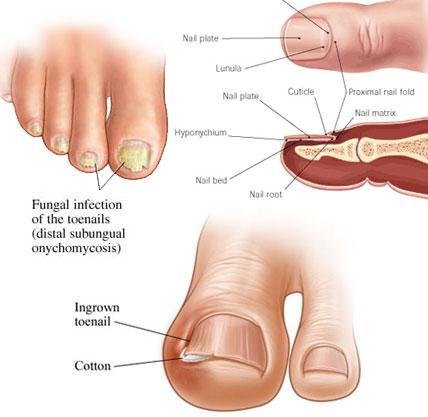Nail Problems
posted: Mar. 18, 2014.
Why are our toenails important?
Toenails are important because they often serve as barometers of our health; they are diagnostic tools providing the initial signal of the presence or onset of systemic diseases. For example, the pitting of nails and increased nail thickness can be manifestations of psoriasis. Concavity nails that are rounded inward instead of outward, can foretell iron deficiency anemia. Some nail problems can be conservatively treated with topical or oral medications while others require partial or total removal of the nail. Any discoloration or infection on or about the nail should be evaluated by a podiatric physician.
Ingrown toenails, the most common nail impairment, are nails whose corners or sides dig painfully into the soft tissue of nail grooves, often leading to irritation, redness, and swelling. Usually, toenails grow straight out. Sometimes, however, one or both corners or sides cure and grow into the flesh. The big toe is usually the victim of this condition, but others toes can also become affected.
Ingrown toenails may be caused by:
- Improperly trimmed nails
- Heredity
- Shoe pressure; crowding of toes
- Repeate trauma to the feet from normal activities
People with diabetes, peripheral vascular disease, or other circulatroy disorders must avoid any form of self treatment and seek podiatric medical care as soon as possible.
Fungal toenails is an fungal infection of the nail, or onychomycosis, is often ignored because the infection can be present for years without causing any pain. The disease is characterized by a progressive change in a toenai's quality and color, which is often ugly and embarassing.
In reality, the condition is an infection underneath the surface of the nail caused by fungi. When the tiny organisms take hold, the nail often becomes darker in color and foul smelling. Debris may collect beneath the nail plate, white marks frequently appear on the nail plate, and the infection is capable of spreading to other toenails, the skins, or even the fingernails. If ignored, the infection can spread and possibly impair one's ability to work or even walk. This happens because the resulting thicker nails are difficult to trim and make walking painful when wearing shoes.
Those who suffer from chronic diseases, such as diabetes, circulatory problems, or immune deficiency conditions, are especially prone to fungal nails. Other contributiong factors may be a history of athlete's foot and excessive perspiration.
Do you have any Nail Problems? If so, please call to schedule your appointment today!
